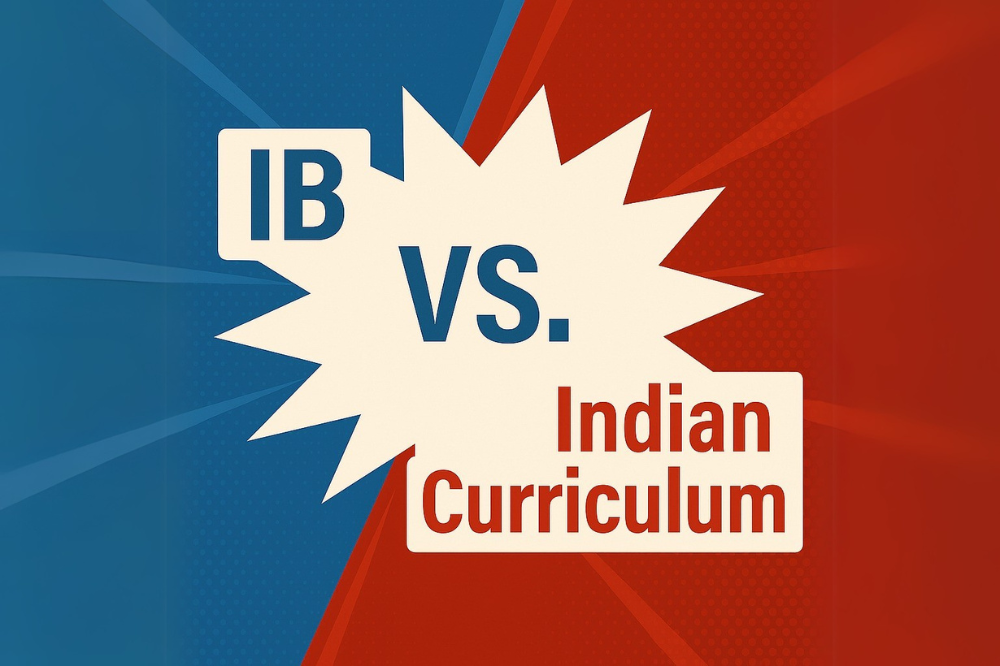Blog > Major Differences: IB vs. Indian Curriculum
Major Differences: IB vs. Indian Curriculum
June 10th, 2025

Education is an important aspect of a child's future, and choosing the correct curriculum turns out to be one of the most critical decisions parents and students have to face. While in India, this crucial decision oscillates between two educational paradigms: the International Baccalaureate (IB) and the Indian national curriculum-laying CBSE, ICSE, and state boards. While both systems have their advantages, they do cater to different ideologies, aspirations, and goals.
Inquiry vs. Memorization-or a Blend
The International Baccalaureate curriculum is based mostly upon inquiry-based learning. It encourages students to form questions, explore concepts, and think critically. For example, when studying history in IB, a student may need to analyse primary sources to question historical narratives, as opposed to simply memorising facts and figures. This concept lays the basis for curiosity and creativity and guides the students toward problem-solving within a world that thrives on these properties.
The Indian curricula, such as CBSE or ICSE, on the contrary, tend to employ standardisation to instill the basics. The foundation is usually laid through textbook-based learning with much emphasis on memorisation. While this ensures uniformity across schools and regions, sometimes it does stand in the way of creative exploration, placing greater pressure on exam performance over practical learning.
A Holistic vs. A More Academic Approach
Evidence of IB's holistic approach can be seen in core components of its TY, EE, and CAS. These processes bring real-world application into the academic curriculum in regards to research skills, independent learning, and community service initiatives. Thus, making a student socially conscious and academically strong.
Assessment Methods: Process vs Outcome
IB’s Continuous Assessment
IB comprises of internal assessments (like essays and projects) and external exams. These assessments evaluate not just what students know but how they apply their knowledge in practical contexts. For instance:
- A biology student might conduct an experiment and write a detailed lab report.
- A history student could analyse historical events through an extended essay.
This evaluation reduces the pressure of exams and also promotes critical thinking.
Indian Curriculum’s Exam-Centric Approach
However, Indian boards rely on final exams to assess student performance. While this system ensures objectivity and standardisation, it can lead to immense stress as students’ futures hinge on a few hours of testing. The focus on theoretical knowledge over practical application may also leave gaps in skills like research or problem-solving.
Global Exposure vs Local Relevance
IB: An Access To Global Education
IB focuses and has an emphasis on global citizenship, making it an excellent choice for students who are aiming for universities abroad. The curriculum’s rigour prepares them for academic challenges at top institutions worldwide. Moreover, IB also helps students to adapt to different environments—an important skill that is required in today’s world.
Indian Curriculum
Indian boards provide education that can adapt to the country’s socio-economic landscape. It helps students for national entrance exams and careers within India by focusing on foundational knowledge that is relevant to local contexts.
Accessibility and Affordability
IB
As compared to CBSE and other Indian Curriculum schools, IB schools are lesser in India—around 200 compared to thousands of CBSE or ICSE schools—and are mostly based in the urban part of the countries. Their high tuition fees (often exceeding ₹4-5 lakhs annually) make IB accessible only to a handful of families.
Indian Curriculum
CBSE and ICSE schools are much more affordable and widespread across India. This accessibility ensures that quality education reaches a broader demographic, making it more inclusive.
Student Experience
IB
The IB curriculum is undeniably more challenging as it demands time management, independent learning, and intellectual curiosity.Here, students have to take care of multiple assignments along with extracurricular commitments like CAS projects. However, this helps them build practical skills that are required for their future.
Indian Curriculum
Indian boards are more straightforward, have a clear syllabus, and have predictable exam patterns—this reduces stress for some students, while others can find it less stimulating as compared to IB.
Choosing between IB and Indian curriculum is not about deciding which is superior—it’s about finding the right fit for each student’s unique needs and goals. The IB curriculum offers a transformative journey that nurtures global citizens equipped for university life abroad. Meanwhile, Indian curricula provide academic foundations tailored to local contexts at an accessible cost.






Add a Comment